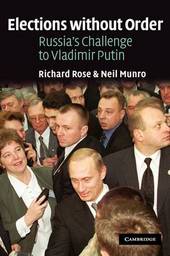
|
Elections without Order: Russia's Challenge to Vladimir Putin
Paperback / softback
Main Details
| Title |
Elections without Order: Russia's Challenge to Vladimir Putin
|
| Authors and Contributors |
By (author) Richard Rose
|
|
By (author) Neil Munro
|
| Physical Properties |
| Format:Paperback / softback | | Pages:274 | | Dimensions(mm): Height 228,Width 152 |
|
| ISBN/Barcode |
9780521016445
|
| Classifications | Dewey:324.947086 |
|---|
| Audience | | Professional & Vocational | | Tertiary Education (US: College) | |
|---|
| Illustrations |
24 Tables, unspecified; 39 Line drawings, unspecified
|
|
Publishing Details |
| Publisher |
Cambridge University Press
|
| Imprint |
Cambridge University Press
|
| Publication Date |
15 August 2002 |
| Publication Country |
United Kingdom
|
Description
Russians want both free elections and order, but order - a sense of predictability in everyday life and the rule of law - has been in short supply. This is the challenge that Russia presents to Vladimir Putin. This book is about Russia's attempt to achieve democratization backwards, holding elections without having created a modern state. It examines the multiplication of parties that do not hold the Kremlin accountable; the success of Vladimir Putin in offering a 'third way' alternative to the Communist Party and the Yeltsin family; the new president's big but vague election mandate; the popular appeal and limits of Putin's coalition; and what the Russian people make of the combination of free elections and disorderly government. Russia is evaluated from the point of view of ordinary Russians, using clear figures and tables drawn from the rich resources of a decade of New Russia Barometer surveys of public opinion.
Author Biography
Richard Rose is Director of the Centre for the Study of Public Policy at the University of Strathclyde. Author of more than forty books and many articles, he is a Fellow of the British Academy and an honorary Fellow of the American Academy of Arts and Sciences. Neil Munro is a Research Fellow at the Centre for the Study of Public Policy at the University of Strathclyde.
Reviews'Rose and Munro have written an important, original, and exceptionally lucid book. Elections Without Order deepens our understanding of the nature and dynamics of political change in Russia during the past decade. The study is conceptually innovative and especially valuable for its analyses of recent trends in Russian public opinion.' Professor George Breslauer, University of California, Berkeley 'Richard Rose, who has a justly high reputation as a comparativist, and Neil Munro, a knowledgeable Russianist, have together produced a very valuable book. Elections without Order rests on the solid foundation of the cumulatively important survey data gathered by Rose on the post-Communist states (from 1992 to the present) and from the authors' skill in interpreting these findings. Rose and Munro pay attention to the state as well as society. In their top-down as well as bottom-up analyses, they perceptively identify and vividly illuminate some of the major obstacles in the path of democratization in Russia.' Professor Archie Brown, Oxford University '... a valuable resource for those hoping to peer through the fog of Russia's political climate and the complex social attitudes underpinning it.' Caroline McGregor, St Petersburg Times '... reveals a fascinating portrait of Russian society ...'. Political Studies Review '... it represents a unique and useful series of snapshots of the mood and political behaviour of the Russian people as they experienced the change from the Yeltsin to Putin presidencies. the volume is much more than this though. It suggests to the reader a thought-provoking series of concepts which help us to comprehend the nature if political change in the Russian party system and of electoral behaviour also represents a well argued and distinctive contribution to the ongoing debate about the emerging role of party politics in the post-communist world.' Party Politics 'It would be hard to find any important topic in Russian politics that is not covered by the survey data presented in this book, which is outstanding for the evidence it presents, just as Richard Rose himself is untouchable in the production of public opinion and psephological data on post-communist Russia and Eastern Europe ... There is no doubt at all about the book's quality and it will have no difficulty in making its way in the world.' Slavonica
|